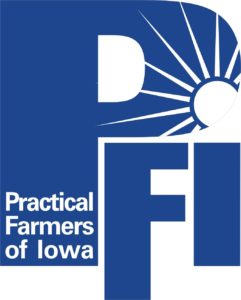 Jerry Peckumn hosting Aug. 31 event
Jerry Peckumn hosting Aug. 31 event
Many Iowa farm fields have low-lying areas, or potholes, that pool water during wet periods. These spots often yield poorly, and are prone to nutrient loss and leaching. Jerry Peckumn farms in the Raccoon River watershed, and while he continues to farm the potholes on his land, he is starting to explore other ways he can manage these problematic areas on his farm.
Peckumn will host a Practical Farmers of Iowa field day on Thursday, Aug. 31, from 10 am to 1 pmnear Jefferson (1712 280th St., about 7.5 miles southeast of town), where he will share some of what he has learned about his farm’s pothole areas, and discuss other conservation measures he uses on the farm.
Jerry farms with his sons Tom and Ben, raising corn and soybeans, along with some hay and beef cattle, on about 1,900 acres. Part of the land is in native prairie, providing wildlife habitat and a refuge for native plants.
In partnership with researchers at Iowa State University, Jerry Peckumn has started to collect data from the in-field potholes on his farm, which he hopes will offer guidance about the best way to manage those areas in the future.
“Prairie potholes need to be evaluated to find the best use of the land,” he says. “Our goal is to make a good return on labor and management while trying to balance conservation practices.”
The event – “Profitability of Farming Prairie Potholes” – is free to attend and will include lunch. Guests are asked to RSVP for the meal to Debra Boekholder, debra@practicalfarmers.org or 515-232-5661, by Monday, Aug. 28. The field day is sponsored by Greene County Conservation, Greene County Soil and Water Conservation District and Iowa Farmers Union.
Guests will learn about in-field prairie potholes, the impacts that farming them has on the environment and farm profitability, and options for managing them. Researchers with ISU’s Team Pothole – including Amy Kaleita, with the Department of Agricultural and Biosystems Engineering, and Steven Hall, with the Department of Ecology, Evolution and Organismal Biology – will explain their research and share ideas on what farmers can do with low areas that don’t yield much during wet years.
Peckumn will also discuss the in-field prairie plantings he has established to help control erosion and provide habitat for wildlife, including native bees. Guests will get to view these prairie strips and hear about the process for establishing them, as well as how they benefit the soil and how they are working on Jerry’s farm.
Practical Farmers’ 2017 field days are supported by several sustaining and major sponsors, including: Ag Ventures Alliance; Albert Lea Seed; Center for Rural Affairs; Fertrell; Gandy Cover Crop Seeders; Grain Millers, Inc.; Iowa Beef Center; Iowa Environmental Council; Iowa State University Department of Agronomy; Iowa Sustainable Agriculture Research and Education (SARE); ISU Extension and Outreach; La Crosse Forage and Turf Seed; Lemken; Leopold Center for Sustainable Agriculture; MOSA Organic Certification; Natural Resources Defense Council; Organic Valley / Organic Prairie; Riverside Feeds, LLC; The Scoular Company; Trees Forever; Unilever; University of Iowa College of Public Health (I-CASH); Upper Iowa Audubon Society; USDA: Natural Resources Conservation Service; Wallace Chair for Sustainable Agriculture; and Welter Seed & Honey Co.
